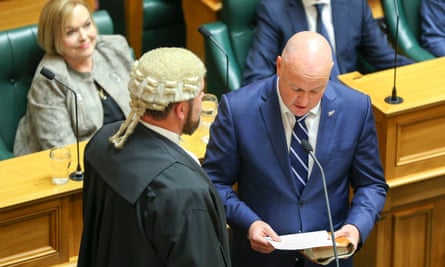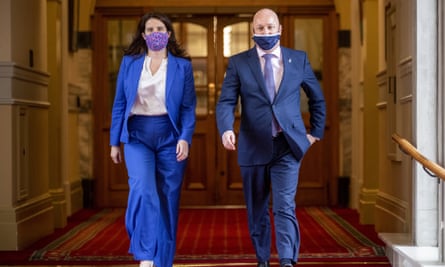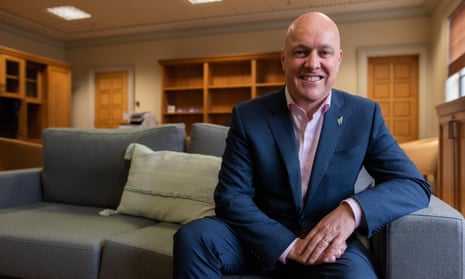Christopher Luxon’s shelves are empty. The solid frames that surround him are devoid of books, the broad expanse of his desk is largely uncluttered by papers, the old oak in and outboxes not yet packed with memos. The New Zealand opposition leader’s office still shouts of being recently and unceremoniously vacated, and its new occupant hasn’t yet made a mark.
“I just literally moved into the office in the last three or four days,” Luxon says, circling to the window for a portrait. It’s been a rapid ascension for the MP, catapulted from the pokier reaches of the opposition floors – “the smallest office in the building,” he says – to the polished-wood expanses of leader’s office. “I’m going to get rid of all this horrible wooden furniture,” he says, glancing around. “I don’t like the stuffiness of it, to be brutally honest with you.”
Luxon’s redecorating task extends far beyond these walls. He has promised to revamp the National party, which has spent 18 months troubled by bleak polling, internal strife and leadership woes. In his first speech as leader, he vowed to rescue the party from the doldrums. “We are the reset,” he announced from behind the podium. “National is back.”
That comeback may be a tough one. Luxon was shunted into the top job ahead of schedule by the implosion of former leader Judith Collins – an iron-willed, experienced political player whose leadership collapsed very publicly last month, when she was dumped by the party after an ill-fated attempt to demote a political rival on the basis of what she alleged were inappropriate comments from 2017.
Luxon, a former chief executive of Air New Zealand who has been in politics for just one year, was heralded as a promising hope for New Zealand’s centre right when he entered parliament. He now takes the helm much earlier than he or his supporters may have wished, transitioning in an unprecedentedly short timeframe from newly minted New Zealand MP to major party leader. As well as uniting a fractious caucus – including three ex-leaders with varying degrees of personal ambition – he’s tasked with going head to head with prime minister Jacinda Ardern, who won a majority victory at the last election, and has seen off four opposition leaders so far.

In the face of this, Luxon is relentlessly chipper, and unfailingly on-message. “If you look at our history over the last four years, there’s been a lot of dysfunction, I guess, is the simplest way to describe it,” he says of the party. “What’s been exciting about this week is that we came together as a team, we had a seamless leadership transition, and we ended up going forward as one unified team.” He does not blink at the phrase “seamless leadership transition”.
So far, commentators on the right have been cautiously pleased with his performance – no major flubs marking his early days, nothing to pull the rug from beneath hopes that he could prove a viable foil to Ardern. Luxon pitches his lack of experience in parliament as a strength. “That’s what this reset has been about,” he says. “To leave the baggage in the past, to turn the page and to go forward.” Instead, he is leaning heavily on his experience in the corporate world, which he says will help him achieve ‘results’ where other politicians bluster.
‘A worthy opponent for Ardern’
A lack of results is one of his primary lines of attack on Ardern whom he says leads a government of “spin and PR,” rather than action. “The prime minister is a very effective communicator, but actually the country needs a lot more than that right now,” he says. “ People actually want to see outcomes and results.”
It’s a criticism that has been levelled at the Ardern administration from the left as well as the right – on some key, long-brewing issues, the government has struggled for traction. Declaration of a climate emergency has not resulted in a drop in New Zealand’s emissions; on the housing affordability crisis, a slew of reforms have not stopped Auckland prices increasing by an average $113,000 over the past three months; on mental health, a $1.9bn investment largely failed to flow through to essential services. The country’s Covid response has produced some of the best public health results in the world, but is now entering its most difficult and uncertain stages.
“I think the New Zealand public are … looking for someone to speak up on some of the frustrations at the moment – so far, he’s been able to articulate that message quite well,” says Brigitte Morton, a ministerial adviser in the last National government. “I think he’s going to be quite a worthy opponent for Ardern.”
What remains to be seen is whether Luxon has clear alternatives to offer. “He’s coming in with an optimistic, if unfilled-in, vision,” says Ben Thomas, a political commentator and former National government staffer and press secretary. “What there isn’t a lot of is detail,” Thomas says, “in particular, the things that will later become relevant – like his individual policy positions.”
In these early interviews, Luxon’s style can sometimes resemble his office shelves. The essential architecture of a political leader is there – a backstory, a ready grin, vision statements, a fondness for the phrase “fundamentally” – but the shelves are sometimes unstocked, especially with particulars. On home territory, discussing New Zealand’s need to increase productivity and improve infrastructure – he is comfortable. Elsewhere, his statements can turn vague. On foreign policy, he will not be drawn on New Zealand’s standing in the Five Eyes security network; the specifics on whether New Zealand should risk angering China, its largest trade partner in joining the US-led diplomatic boycott of the Beijing Olympics.

On the subject of his evangelical faith – a relatively unusual designation in New Zealand political leadership – and how it could inform his approach to conscience votes like abortion, euthanasia and legalisation of cannabis, he again deploys broader brushstrokes. “I want to be the prime minister of New Zealand, who just happens to have faith – not actually be the faith prime minister of New Zealand,” he says. “I have a personal faith, I haven’t been to a church for five years. It’s fundamentally something personal to me, it gives me purpose, it gives me meaning, it puts me in a context of something bigger than myself. And I think that’s a good thing.” He does note that he has no plans to relitigate abortion reform, which he says was “settled” by the last parliament.
On housing, like his political peers, he is unwilling to say whether house prices should drop – although even a 30% drop in prices would only return Auckland to the heady days of March 2020.
“It’s a difficult one to answer, that question, in terms of should house prices fall – we definitely want to see house prices become more affordable for everybody,” he says. “There may be a period of time where house prices do go backwards, frankly, but over the long run, we want to see slow, stable, steady growth, not strong double digit growth.”
Luxon himself owns seven properties, one of the largest and most valuable property portfolios in parliament. He says that does not put him out of touch with the New Zealanders that don’t own a home.
In the coming months, the new leader’s challenge will be to fill in the gaps in his vision. “People will expect big things from him quickly – so time is not on his side,” says Shane Te Pou, a political commentator and former Labour party activist. Then again, he says. “The National party needed a change. Certainly they’re much better off than they were two weeks ago.”
‘A galvanising effect’
Thomas says for now, the broad brush strokes are likely all Luxon needs: he has the quiet weeks of New Zealand’s summer to do the strategic work of fleshing out a policy vision for the party, and learning to articulate it.
“The challenge for him will be being able to react instinctively and fleet-footedly in essentially a 24/7 media environment now, where politicians are expected to be across and have opinions on a great deal of subjects,” Thomas says. For someone shifting from relatively low-profile portfolios to spokesperson for the party, that could prove tricky. “His biggest challenge will be the unity of caucus,” Morton says. And Luxon says this will be his first focus.
“I’ve seen lots of political parties have a very charismatic leader and a very poor team and they do very poorly,” he says. “[I’m] doing a lot of things for the first time, because I am new to politics. But it has underscored to me the value of teamwork and the belief fundamentally that politics is a team sport.”
Among the party faithful, Thomas says, Luxon’s ascendance has had “a galvanizing effect” – even if it hasn’t reached the heights provoked by Ardern’s emergence from her struggling party ahead of the 2017 election.
“Rather than pure excitement, the emotional response has been leavened with relief.”

Comments (…)
Sign in or create your Guardian account to join the discussion